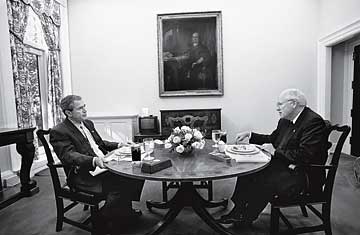
Bush and Cheney, pictured in October 2001, planned the war on terrorism but broke over whether to pardon one of its key architects
(4 of 9)
And there were these two sentences: "Our entire system of justice relies on people telling the truth," Bush said. "And if a person does not tell the truth, particularly if he serves in government and holds the public trust, he must be held accountable." Particularly if he serves in government. Bush's allies would say later that the language was intended to send an unmistakable message, internally as well as externally: No one is above the law.
The Special Relationship
A former White House chief of staff, Congressman and Pentagon boss, Cheney had an uncanny ability to guide Bush's decisions. Even as he claimed expansive Executive powers for the President, Cheney salted the bureaucracy with allies who could alert him in advance about policy disagreements, help him influence internal debates at key moments and give him a leg up in framing issues for the President. He was always deferential to Bush, often waiting with head down and hands clasped behind his back to address the President. Both by habit and by design, he cultivated a relationship that suited Bush's view of their roles: the President as the "decider" and Cheney as the éminence grise who counseled him. In reality, by wiring the bureaucracy and being the last person Bush spoke with on many key decisions, Cheney became a "sounding board for advice he originated himself," as biographer Barton Gellman put it.
Plamegate, as the leak scandal was dubbed, tested the trust between the two men like nothing before. Bush had promised high ethical standards after the Clinton era and a "fresh start after a season of cynicism," a veiled reference to Clinton's troubles with truth-telling under oath in the Monica Lewinsky scandal. In the Plame investigation, a prosecutor with broad authority jarred Bush's White House by issuing deposition orders and demands for documents. Bush himself was interviewed by Fitzgerald on June 24, 2004, as was Cheney some four months later.
The investigation also coincided with the darkest period of the Administration: the Iraq war's dramatic downturn, the absence of WMD and festering problems in Afghanistan. And it unfolded as Bush was launching a wholesale course correction of his presidency in his second term. The pivot was hard to miss. Where Cheney had urged unilateral U.S. action in the first term, "in the second term we're going to be doing more diplomacy," Bush told top aides. Where Cheney had orchestrated a secret push to embrace the "dark side" in the war on terrorism, Bush instructed aides in 2005 to begin to seek congressional approval for some of the Administration's most controversial programs, such as its terrorist-detention policies. At the State Department, Bush installed Condoleezza Rice, for whom some Cheney allies had open contempt. As Secretary of State she would spend the next several years trying to repair damaged relations with allies around the globe and opening diplomatic initiatives that Cheney and his team had spent several years shutting down.
